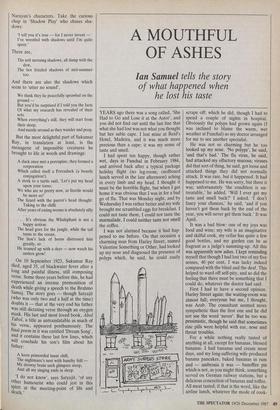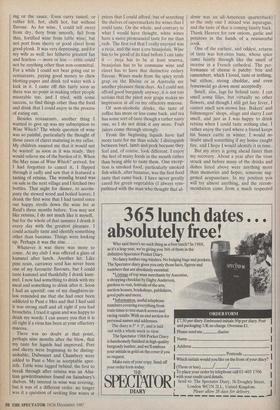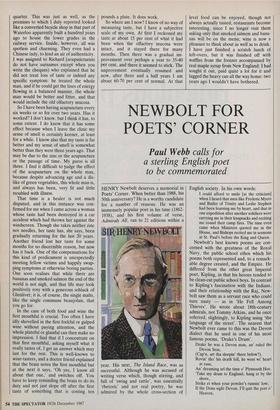A MOUTHFUL OF ASHES
Ian Samuel tells the story of what happened when he lost his taste
YEARS ago there was a song called, 'She Had to Go and Lose it at the Astor', and you did not find out until the last line that what she had lost was not what you thought but her sable cape. I lost mine at Reid's Hotel, Madeira, and it was much more precious than a cape: it was my sense of taste and smell.
I had spent ten happy, though rather wet, days in Funchal in February 1984, and arrived back after a typical package holiday flight (no leg-room, cardboard lunch served in the late afternoon) aching in every limb and my head. I thought it must be the horrible flight, but when I got home it was obvious that I was in for a bad go of flu. That was Monday night, and by Wednesday I was rather better and my wife brought me scrambled eggs for breakfast. I could not taste them; I could not taste the marmalade, I could neither taste nor smell the coffee.
I was not alarmed because it had hap- pened to me before. On that occasion a charming man from Harley Street, named Valentine Something or Other, had looked up my nose and diagnosed the presence of polyps which, he said, he could easily scrape off; which he did, though I had to spend a couple of nights in hospital. Obviously the polyps had grown again (I was inclined to blame the warm, wet weather at Funchal) so my doctor arranged for me to see another specialist.
He was not so charming but he too looked up my nose. 'No polyps', he said, 'and that's bad.' The flu virus, he said, had attacked my olfactory mucosa; viruses did that sort of thing, he said, got loose and attacked things they did not normally attack. It was rare, but it happened. It had happened to me. He was sorry, but there it was; unfortunately 'the condition is un- treatable,' he added. 'Will I ever get my taste and smell back?' I asked. 'I don't fancy your chances,' he said, 'and if you haven't got them back by the end of the year, you will never get them back.' It was April.
It was a bad blow: one of my joys was food and wine; my wife is an imaginative and skilful cook, my cellar has quite a few good bottles, and my garden can be as fragrant as a judge's summing-up. All this was apparently now ashes. I kept reminding myself that though I had lost two of my five senses, 40 per cent, I was lucky indeed compared with the blind and the deaf. This helped to ward off self-pity, and so did the feeling that there must be something that I could do, whatever the doctor had said.
First I had to have a second opinion. Harley Street again: the waiting-room was almost full; everyone but me, I thought, was Arab. The consultant seemed more sympathetic than the first one and he did not use the word 'never'. But he too was pessimistic, though he said that sometimes zinc pills were helpful with ear, nose and throat troubles.
For a while nothing really tasted of anything at all, except for bananas, blessed bananas. I had bananas and cream most days, and my long-suffering wife produced banana pancakes, baked bananas in rum and — ambrosia it was — banoffee pie which is not, as you might think, something served on German railway stations, but a delicious concoction of bananas and toffee. All meat tasted, if that is the word, like the airline lunch, whatever the mode of cook- ing or the sauce. Even curry tasted, or rather felt, hot, chilli hot, but without flavour. As for wine, I could tell sweet from dry, fiery from smooth, full from thin, fortified wine from table wine; but not port from sherry or good claret from good plonk. It was very depressing, and for my wife as well: her hitherto greatest fan and fearless — more or less — critic could not be anything other than non-committal. For a while I could not bear going out to restaurants, paying good money to chew blotting-paper and drink red water with a kick in it. I came off this fairly soon as there was no point in making other people miserable too, and I tried, with some success, to find things other than the food and drink that I could enjoy in the process of eating out.
Besides restaurants, another thing I wanted to give up was my subscription to Wine Which? The whole question of wine was so painful, particularly the thought of those cases of claret maturing in my cellar. My children assured me that it would not be wasted: as soon as it was ready, they would relieve me of the burden of it. When the May issue of Wine Which? arrived, for I had forgotten to cancel it, I flipped through it sadly and saw that it featured a tasting of retsina. The winning brand was on sale in the next village and I fetched two bottles. That night for dinner, to accom- pany the stewed wood and boiled leaves, I drank the first wine that I had tasted since our happy strolls down the wine list at Reid's three months before. You may not like retsina; I do not much like it myself, but for the whole of that summer I drank it every day with the greatest pleasure. I could actually taste and identify something other than bananas. Things were looking up. Perhaps it was the zinc. . . .
Whatever it was there was more to come. At my club I was offered a glass of kummel after lunch. Another hit. Like pine resin, carraway seed has never been one of my favourite flavours, but I could taste kummel and thankfully I drank kum- mel. I now had something to drink with my meal and something to drink after it. Soon I had an aperitif: one of my daughters-in- law reminded me that she had once been addicted to Punt e Mes and that I had said it was strong stuff and all right if you had bronchitis. I tried it again and was happy to drink my words: I can assure you that it is all right if a virus has been at your olfactory mucosa.
There was no doubt at that point, perhaps nine months after the blow, that my taste for liquids had improved. Port and sherry were beginning to be disting- uishable; Dubonnet and Chambery were added to Punt e Mes as acceptable aper- itifs. Table wine lagged behind; the first to break through after retsina was an Alsa- tian gewiirztraminer found on Sainsbury's shelves. My interest in wine was reviving, but it was of a different order: no longer was it a question of seeking fine wines at prices that I could afford, but of searching the shelves of supermarkets for wines that I could taste. On the whole, and contrary to what I would have thought, white wines have a more pronounced taste for me than reds. The first red that I really enjoyed was a rioja, and the next a cru beaujolais. Wine has to be good of its kind before I can taste it — rioja has to be at least reserva, beaujolais has to be commune wine and claret has to have that distinctive cedary flavour. Wines made from the spicy syrah grap on the RhOne or in Australia are another pleasure these days. As I could not afford good burgundy anyway, it is not too serious that the pinot noir grape makes no impression at all on my olfactory mucosa.
Of non-alcoholic drinks, the taste of coffee has more or less come back, and tea has some sort of taste though a rather nasty one, so I do not drink it any more. Fruit juices come through strongly.
From the beginning liquids have had more taste for me than solids: I distinguish between beef, lamb and pork because they feel and, of course, look different. I enjoy the feel of many foods in the mouth rather than being able to taste them. One excep- tion is smoked food, particularly smoked fish which, after bananas, was the first food taste that came back. I have never greatly cared for green vegetables (I always sym- pathised with the man who thought that al- dente was an all-American quarterback) so the only one I missed was asparagus, and the taste of that is coming faintly back. Thank Heaven for raw onions, garlic and potatoes in the hands of a resourceful cook.
One of the earliest, and oddest, returns of taste was hot-cross buns, whose spice came faintly through like the smell of incense in a French cathedral. The per- formance of cheese is patchy: brie and camembert, which I loved, taste or nothing, but stilton, strong cheddar, and even lymeswold go down most acceptedly.
Smell, alas, lags far behind taste. I can smell some lilies, but, virtually no other flowers, and though I still get hay fever, I cannot smell new-mown hay. Bakers' and fishmongers' shops, silage and slurry I can smell, and just as I was happy to drink retsina when I could taste nothing else, I rather enjoy the yard where a friend keeps his Sussex cattle in winter. I would no doubt smell something if my house caught fire, and I hope I would identify it in time.
But my story is going ahead faster than my recovery. About a year after the virus struck and before many of the drinks and dishes listed above were anything more than memories and hopes, someone sug- gested acupuncture. In my position you will try almost anything, and the recom- mendation came from a much respected quarter. This was just as well, as the premises to which I duly reported looked like a converted bicycle shop in that part of Waterloo apparently built a hundred years ago to house the lower grades in the railway service. Inside, however, all was spotless and charming. They even had a Chinese lady, to lend an air of authenticity. I was assigned to Richard (acupuncturists do not have surnames except when you write the cheques) who explained that he did not treat loss of taste or indeed any specific symptom: he treated the whole man, and if he could get the lines of energy flowing in a balanced manner, the whole man would be better and fitter, and that would include the old olfactory mucosa.
So I have been having acupuncture every six weeks or so for over two years. Has it worked? I don't know, but I think it has, to some extent. I do know that it has some effect because when I leave the clinic my sense of smell is certainly keener, at least for a while. I know also that my taste is far better and my sense of smell is somewhat better than they were three years ago. That may be due to the zinc or the acupuncture or the passage of time. My guess is all three. I find it difficult to judge the effect of the acupuncture on the whole man, because despite advancing age and a dis- like of green vegetables, this whole man is, and always has been, very fit and little troubled with illness.
That time is a healer is not much disputed, and in this instance was con- firmed for me when I came across a woman whose taste had been destroyed in a car accident which had thrown her against the windscreen. Though she takes neither zinc nor needles, her taste has, she says, been gradually returning for the last 20 years. Another friend lost her taste for some months for no discernible reason, but now has it back. One of the compensations for this kind of predicament is unexpectedly meeting fellow victims and happily swap- ping symptoms at otherwise boring parties. One soon realises that while there are bananas and smoked salmon the end of the world is not nigh, and that life may look positively rosy with a generous schluck of Glenlivet; it is, of course, the single malts, like the single commune beaujolais, that you go for.
In the case of both food and wine the first mouthful is crucial. Too often I have idly shovelled in the first forkful or gulped wine without paying attention, and the whole plateful or glassful can then make no impression. I find that if I concentrate on that first mouthful, asking myself what it really tastes of, I get an answer which may last for the rest. This is well-known to wine-tasters, and a doctor friend explained that the brain notes the first mouthful but at the next it says, 'Oh yes, I know all about that one,' and switches off. You have to keep reminding the brain to do its duty and not just slope off after the first taste of something that is costing ten
pounds a plate. It does work.
So where am I now? I know of no way of measuring taste, but I have a subjective scale of my own. At first I reckoned my taste at about 15 per cent of what it had been when the olfactory mucosa were intact, and it stayed there for many months. Then there was a gradual im- provement over perhaps a year to 35-40 per cent, and there it seemed to stick. The improvement eventually resumed and now, after three and a half years I am about 60-70 per cent of normal. At that level food can be enjoyed, though not always actually tasted; restaurants become interesting, since I no longer visit them asking only that smoked salmon and bana- nas will be on the menu; wine is now a pleasure to think about as well as to drink. I have just finished a scratch lunch of left-overs, but it was finished off with waffles from the freezer accompanied by ' real maple syrup from New England: I had sought it out, paid quite a lot for it and lugged the heavy can all the way home: two years ago I wouldn't have bothered.












































































































 Previous page
Previous page